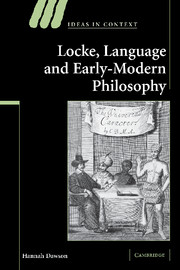Book contents
- Frontmatter
- Contents
- Acknowledgements
- Notes on the text
- Introduction
- PART I LANGUAGE IN THE TRIVIUM
- PART II PHILOSOPHICAL DEVELOPMENTS OF THE PROBLEM OF LANGUAGE
- PART III LOCKE ON LANGUAGE
- 7 Words signify ideas alone
- 8 Semantic instability: an inherent imperfection
- 9 A life of their own
- 10 Locke in the face of language
- Bibliography
- Index
- IDEAS IN CONTEXT
7 - Words signify ideas alone
Published online by Cambridge University Press: 22 September 2009
- Frontmatter
- Contents
- Acknowledgements
- Notes on the text
- Introduction
- PART I LANGUAGE IN THE TRIVIUM
- PART II PHILOSOPHICAL DEVELOPMENTS OF THE PROBLEM OF LANGUAGE
- PART III LOCKE ON LANGUAGE
- 7 Words signify ideas alone
- 8 Semantic instability: an inherent imperfection
- 9 A life of their own
- 10 Locke in the face of language
- Bibliography
- Index
- IDEAS IN CONTEXT
Summary
Like the reader, Locke is immersed in the discursive framework that I have laid out. Emerging from his books, he vehemently attacks the widespread assumptions, echoed and bred in the logical tradition, either that words are an unmediated nomenclature of things or that the concepts which do mediate things represent them perfectly and realistically. These assumptions are apparent in the secret fusion of concepts and things which melts away or downplays the mentalism to which everyone simultaneously, if sometimes less obviously, subscribes. But Locke takes his ammunition from the very target of his fire. He repeats the universal assumption that a speaker expresses his ideas about the world and, in the context of his (r)evolutionary epistemology, pushes it steadily to its necessary conclusions. Given his twin beliefs that all our external knowledge is derived from sense perception, and that there is a radical discontinuity between appearance and reality, our words simply cannot capture the heart of things. While it was a well-worn conviction that we can only talk about the world as we know it, we have seen that concepts and things were frequently collapsed into each other with unabashed confidence, to present an apparently seamless continuity of language, mind and world. With unprecedented force Locke robs this triumvirate of its last man. His tirade about language therefore fits squarely into his overarching philosophical polemic. Just as he tightly reins in our claims to real– or ‘adequate’– knowledge, so does he bridle our mouths.
- Type
- Chapter
- Information
- Locke, Language and Early-Modern Philosophy , pp. 185 - 209Publisher: Cambridge University PressPrint publication year: 2007



